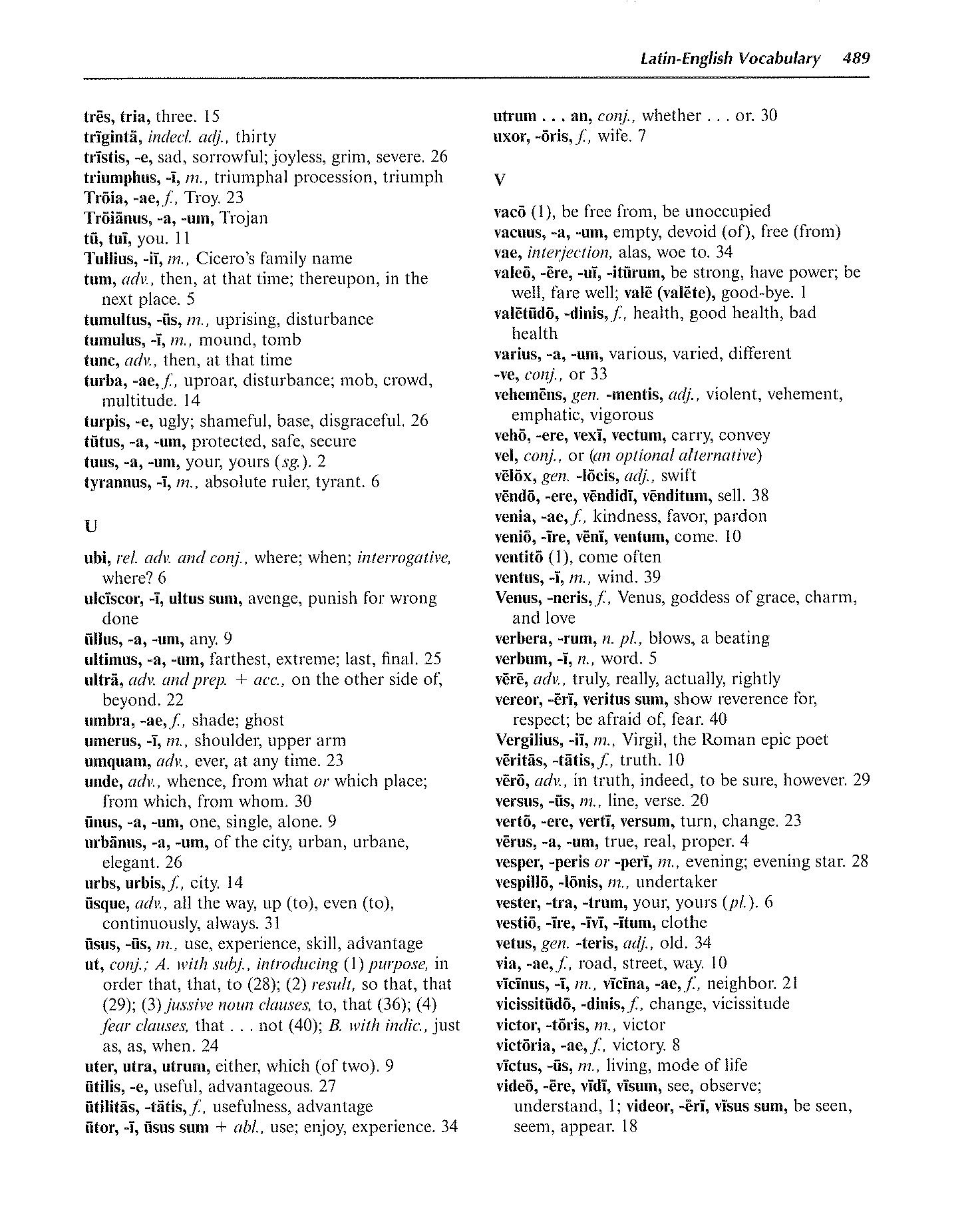
page_listing.tpl
page_subListingDetails.tpl
sub_listingDetails_style1.tpl
sub_listingDetails.title.tpl
tūtus safe
tūtus is a Latin Adjective that primarily means safe.
Definitions for tūtus
Wheelock's Latin
Adjective
- 1
protected, safe, secure
Oxford Latin Dictionary
Adjective
- 1
(of persons or things) Protected from danger or harm, safe, secure. (b) safe from the consequences of one's actions, unpunished. (c) safe from adverse judgment. (d) safe from disease or sim, immune.
- 2
(of a person, pregn.): (a) on one's guard, watchful. (b) enjoying a sense of security, feeling safe.
- 3
(of places) Containing no danger, sheltered, safe (sts. = affording shelter or protection). (b) (of conditions). (c) (of fortifications, armour, or sim.). (d) (of confinement in prison) close, secure. (e) (neut. pl. as sb.) a safe situation, safe ground.
- 4
(neut. in advl. phrs.): (a) in ~o, In a safe place; (transf.) in a secure situation, on a safe footing. (b) in ~um, into a secure position, into safety; (also transf.). (c) ex ~o, from a position of safety.
- 5
(of activities, undertakings, etc.) Free from risk, safe. (b) (~um est, etc., as complement of inf. or acc. and inf.) (c) (spec.) free from the risk of violence of bloodshed.
Sentences with tūtus
Latin to English
Est et fideli tuta silentio merces.Compare Loyal reticence too has its reward secure.
Auream quisquis mediocritatem diligit tutus caret obsoleti sordibus tecti, caret invidenda sobrius alta.Compare Who so loves well the golden mean avoids the squalor of a ruinous hovel and is safe, is sober and avoid the palace that attracts envy.
Heu facinus! non est hostis metuendus amanti; quod credis fidos, effuge, tutus eris.Compare Ah, the reproach of it! no foe need a lover fear; fly those whom you deem faithful, and you will be safe.
Tutus vita sui ibi vivo arbitror.Compare They think that they shall live a safer life there.
Data sources
Notes
- Definitions
- Frederick M. Wheelock, Wheelock's Latin, 6th ed., rev. Richard A. LaFleur (New York, NY: HarperCollins Publishers, 2005): 489.
- P. G. W. Glare, Oxford Latin Dictionary, Vols. 1-8 (Oxford: Clarendon Press, 1982): 1997.
- Word frequencies
- Christopher Francese, "Latin Core Vocabulary," Dickinson College Commentaries, last modified 2014, http://dcc.dickinson.edu.
- Paul B. Diederich, The Frequency of Latin Words and Their Endings, PhD diss., (Columbia University, 1939).
- Louis Delatte, Suzanne Govaerts, Joseph Denooz, and Etienne Evrard, Dictionnaire fréquentiel et index inverse de la langue latine [Frequency Dictionary and Inverse Index of the Latin Language] (Liège, Belgium: Laboratoire d'analyse statistique des langues anciennes de l'Université de Liège [L.A.S.L.A.], 1981): 122.
Bibliography
Allen, Joseph H. Allen and Greenough's New Latin Grammar for Schools and Colleges: Founded on Comparative Grammar. Edited by James B. Greenough, George L. Kittredge, Albert A. Howard, and Benjamin L. D'Ooge. Boston, MA: Ginn & Company, 1903.
Crystal, David. A Dictionary of Linguistics and Phonetics. 6th ed. Oxford, UK: Blackwell Publishing, 2008.
Delatte, Louis, Suzanne Govaerts, Joseph Denooz, and Etienne Evrard. Dictionnaire fréquentiel et index inverse de la langue latine [Frequency Dictionary and Inverse Index of the Latin Language]. Liège, Belgium: Laboratoire d'analyse statistique des langues anciennes de l'Université de Liège (L.A.S.L.A.), 1981.
Diederich, Paul B. The Frequency of Latin Words and Their Endings. PhD diss., Columbia University, 1939.
Francese, Christopher. "Latin Core Vocabulary." Dickinson College Commentaries. Last modified 2014. http://dcc.dickinson.edu/latin-vocabulary-list.
Gildersleeve, Basil L., and Gonzales Lodge. Gildersleeve's Latin Grammar: Third Edition, Revised, and Enlarged. 3rd ed. London, England: Macmillan and Co., 1903.
Glare, Peter G.W. Oxford Latin Dictionary. Vols. 1-8. Oxford, England: Clarendon Press, 1982.
Krüger, Bernd. "Latin Conjugation Tables." Cactus2000. Accessed May 5, 2023. https://latin.cactus2000.de/index.en.php.
Pierson, Nick. "Sound of Text." Accessed October 26, 2019. https://soundoftext.com.
Wheelock, Frederick M. Wheelock's Latin. 6th ed. Revised by Richard A. LaFleur. New York, NY: HarperCollins Publishers, 2005.
Wiktionary Contributors. "Victionarium." Wikimedia Foundation, Inc. Updated March 18, 2019. https://la.wiktionary.org/wiki/Victionarium:Pagina_prima.
Citation
Chicago (17th ed.)
Allo Contributors. "tūtus, tūta, tūtum (adj.) - Latin Word Definition." Allo Latin Dictionary. Last modified . Accessed January 30, 2026. http://ancientlanguages.org/latin/dictionary/tutus-tuta-tutum.
Entry created on . Last updated on .







